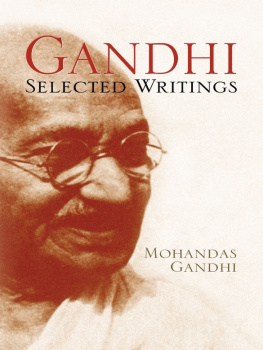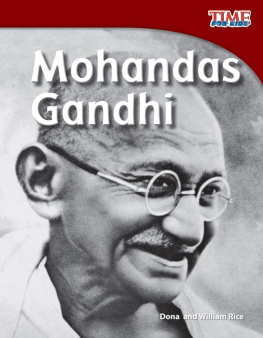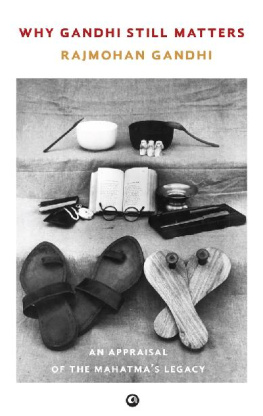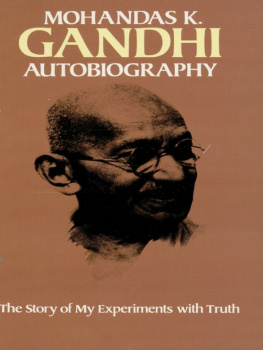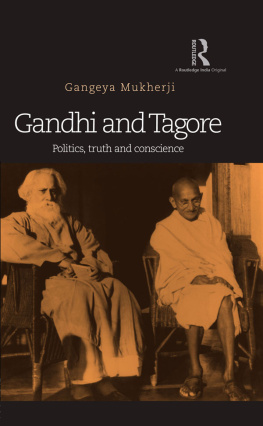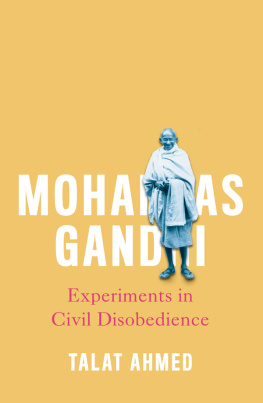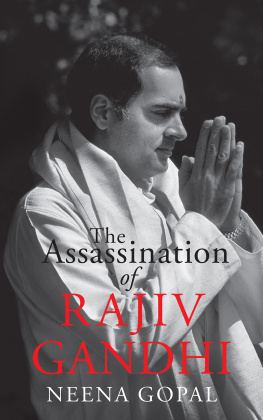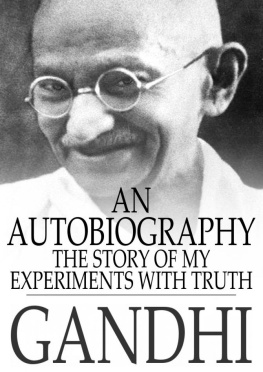Copyright
Copyright 1951, 1979 by Homer A. Jack All rights reserved.
Bibliographical Note
This Dover edition, first published in 2005, is an unabridged republication of the work originally published in 1951 by The Beacon Press, Boston.
Library of Congress Cataloging-in-Publication Data
Gandhi, Mahatma, 18691948.
[Selections. 1951]
The wit and wisdom of Gandhi / Mohandas Gandhi ; edited by Homer A. Jack ; preface by John Haynes Holmes.
p. cm.
Reprint. Originally published: Boston : Beacon Press, 1951.
Includes bibliographical references and index.
9780486122410
1. Jack, Homer Alexander. II. Title.
DS481.G3A25 2005
954.035092dc22
2004065695
Manufactured in the United States of America
Dover Publications, Inc., 31 East 2nd Street, Mineola, N.Y. 11501
To my mother
PREFACE
GANDHI was a voluminous writer on a vast variety of topics. I doubt if even the prodigious Voltaire could rival him. For years he wrote innumerable letters, composed editorials and articles regularly each week for his famous newspapers, Young India, Navajivan, and Harijan, published books, and in 1927 crowned his literary labors with his two-volume autobiography, The Story of My Experiments with Truth. In addition there were endless interviews, public addresses, prayer talks, even casual conversations, which were taken down and printed verbatim in the daily press in India and beyond. There was never anything like it! Pyarelal Nayyar, the Mahatmas official biographer, may well feel himself daunted by the ocean of material that stretches before him.
Gandhis literary achievement is the more remarkable in view of the fact that he was never, in any sense of the phrase, a literary man. Unlike his great contemporary, Rabindranath Tagore, and his accomplished successor, Pandit Nehru, the Mahatma had no especial grace of style. Seldom, if ever, in his writings, did he rise to heights of eloquence and beauty. Memorable passagesi.e., memorable for their own sakeare rarely found. Gandhis interests were never aesthetic, but rather pragmatic. He had no desire or ambition, no time, to be an artist. His one thought was of his own people, and his struggle to make them free. So he wrote with disciplined simplicity, seeking only to make himself clearly understood. The result was the one most important quality of literary artnamely, clarity. I doubt if, in all his works, Gandhi ever wrote a sentence which failed to express with utter precision the thought he had in mind to convey. Gandhi mastered his medium. He wrought a style which was perfect for his purpose of communication. To read his writings is to think of content and not of stylewhich means a triumph in the adaptation of means to ends.
It is into this vast Gandhian sea that Homer Jack has had the courage to plunge. Like the sponge-diver, he has sought and brought to the surface the best of the myriad growths which would have otherwise been lost. Like the chemist in his laboratory, he has analyzed the compound before him, and produced a distillation of all the most precious elements therein concealed. Or, dropping all more or less artificial figures of speech, Mr. Jack has performed the stupendous task of reading great masses of Gandhis writing, and bringing to us the winnowing for our inspection. What we would never have done ourselves, he has done for us. We can now peruse this book with the serene content that the best that Gandhi ever wrote and said is here before us.
What impresses me, in this anthology of Gandhis mind, is the excellence of the selections. There are more gems of wit and wisdom here than I supposed would have been found. Mr. Jack has been wise enough to make his quotations short rather than long, and therefore to the point. The temptation must have been strong upon him to float along the easy current of the Mahatmas thought. But this would have buried the Mahatma anew in the sheer mass of his writings. With excellent judgment, Mr. Jack has made his pieces brief and incisive, and therewith has increased rather than diminished the effectiveness of Gandhis thought. Nowhere do I find any evidence of skimping the materialleast of all, any abuse of context. I count this editorial work of a high order.
The same is true of the classification of material. This has been done with skill and impeccable good taste. Religion, theology, personal ethics, social ethics (love), service, international affairs, political affairs, the family, education, culture and the professions, Indian problems, Gandhi himselfthese are the topics chosen, and all are clarified and illuminated by the cogency of Gandhis words. Who can doubt the greatness of Gandhis spirit, and the lucidity and power of his mind, as here revealed in the ever-recurring flashes of his genius?
I count it a privilege to commend this book to what I hope will be a host of readers. My feeling is that numberless persons who have known nothing of Gandhi will here discover him, and therewith enrich their lives. Those who have long known and revered the Mahatma will here refresh themselves as at some wayside shrine. In either case, Mr. Jack as editor may well feel rewarded for his labors.
JOHN HAYNES HOLMES
New York, N. Y.
ACKNOWLEDGMENTS
The quotations from Gandhi used in this book are reprinted with the permission of the Navajivan Trust of Ahmedabad, India, in which the copyright of all of M. K. Gandhis writings are vested. Grateful acknowledgment is also made for permission from the following publishers to reprint copyright material:
Abingdon-Cokesbury Press, Nashville, Tenn., for quotations from Mahatma Gandhi: An Interpretation, by E. Stanley Jones.
Allen & Unwin, Ltd., London, for quotations from Mahatma Gandhi s Ideas, by C. F. Andrews.
Appleton-Century-Crofts, Inc., New York City, for quotations from Mahatma Gandhi, by Romain Rolland:
Doubleday and Company, Inc., Garden City, New York, for quotations from Great Soul: The Growth of Gandhi, by Herrymon Maurer.
Duell, Sloan and Pearce, New York City, for quotations from A Week with Gandhi, by Louis Fischer (copyright 1942 by Louis Fischer).
Harper and Brothers, New York City, for quotations from The Life of Mahatma Gandhi, by Louis Fischer and Gandhis Letters to a Disciple.
G. A. Natesan and Co., Madras, India, for quotations from Gandhis Speeches and Writings.
Oxford University Press, New York City, for quotations from What Does Gandhi Want? by T. A. Raman.
Public Affairs Press, Washington, D. C., for quotations from Gandhis Autobiography: The Story of My Experiments with Truth, by M. K. Gandhi.
Random House, Inc., New York City, for quotations from Lead, Kindly Light, by Vincent Sheean.
Henry Regnery Company, Chicago, Illinois, for quotations from Satyagraha: The Power of Truth, by R. R. Diwakar.
D. G. Tendulkar of Bombay, India, for quotations from Gandhiji: His Life and Work.
The editor is deeply grateful to John Haynes Holmes for writing the preface and, more than anybody else, for helping him to understand Gandhi. The editor acknowledges his indebtedness to the staff of the Beacon Press for aid in the publication of this volume. Without time taken from his parish and especially from his family, the editor would never have completed this task.




